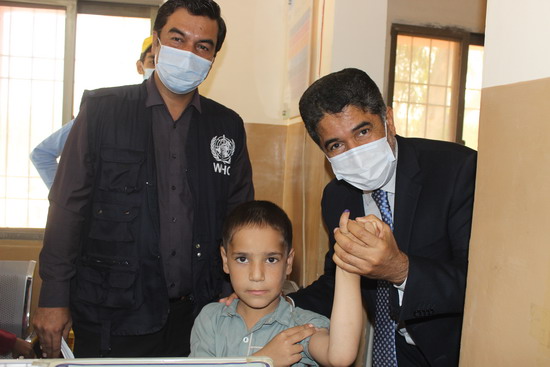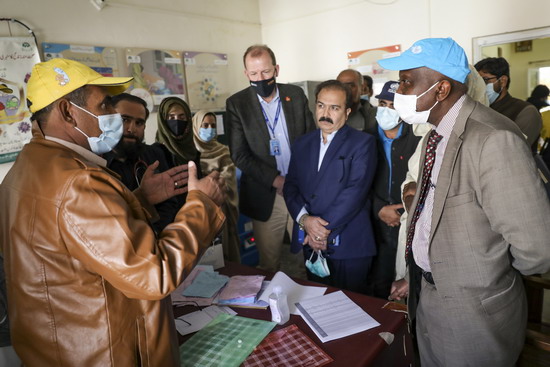 WHO Regional Director, Dr Ahmed Al-Mandhari, observes polio vaccination in Karachi
WHO Regional Director, Dr Ahmed Al-Mandhari, observes polio vaccination in Karachi
UNICEF and WHO Regional Directors visit the polio-endemic country as efforts to eradicate polio yield crucial progress
ISLAMABAD, Pakistan, 13 December 2021 – UNICEF Regional Director for South Asia, Mr George Laryea-Adjei, and WHO Regional Director for the Eastern Mediterranean, Dr Ahmed Al-Mandhari, recently concluded a visit to Pakistan to support the polio programme as it closes in on the long-sought goal of eradicating polio.
Both Regional Directors said that they continue to be impressed by the high level of government leadership and engagement at all levels – from Prime Minister Imran Khan, who chaired a meeting of the National Task Force on Polio Eradication which the two directors attended, to provincial ministers of health, chief secretaries and district commissioners in the key provinces of Sindh, Baluchistan and Khyber Pakhtunkhwa. Only one child paralyzed by wild poliovirus has been detected in Pakistan in 2021, an impressive result compared to the 306 children with paralytic polio reported in 2014. The polio programme has come a long way since an estimated 20 000 children paralyzed by polio in 1994.
This was Laryea-Adjei’s and Al-Mandhari’s second joint mission to support the polio programme in Pakistan as part of a visit of the Polio Oversight Board, the highest decision-making body in the Global Polio Eradication Initiative. Together with Afghanistan, Pakistan is one of only two remaining countries in the world to still have active wild poliovirus transmission.
The Regional Directors agreed the programme is now at a critical juncture. Noting that that the virus will exploit any weakness, they emphasized the need to reinforce the impressive progress achieved in reducing the number of missed children and vaccine refusals, and to continue targeting high-risk areas, particularly southern Khyber Pakhtunkhwa and those along the border with neighbouring Afghanistan.
The Regional Directors congratulated the Pakistan programme on the results of its recent surveillance review, which found the country’s polio surveillance system to be performing strongly. The review recommended additional measures to further enhance virus detection capacity, particularly in high-risk areas and among high-risk groups. Noting that surveillance was a key driver of eradication efforts, Laryea-Adjei and Al-Mandhari urged the programme to remain hyper vigilant and to continue to search for and encourage the reporting of suspected cases of acute flaccid paralysis (AFP).
Children affected by wild poliovirus recently detected in northern Afghanistan and the recent environmental detection of poliovirus in southern Khyber Pakhtunkhwa in Pakistan serve as a reminder that the polio virus does not recognize borders.
“Afghanistan and Pakistan must work together to fully capitalize on the current opportunity of low numbers of children paralyzed by poliovirus,” said WHO Regional Director, Dr Ahmed Al-Mandhari. “To interrupt transmission, we need both countries to engage bilaterally on this shared threat. Focusing on areas along the border of the two countries, and on mobile and cross-border populations is the key to eradication. The upcoming polio vaccination campaigns must reach all children in both countries.”
The Regional Directors’ visit took place as front-line workers immunized almost 32 million children under-five years of age against polio during a two-week drive coordinated with an historic measles and rubella campaign. Led by Pakistan’s expanded programme on immunization (EPI), the latter reached nearly 93 million children, with support from UNICEF, WHO and Gavi, the Vaccine Alliance. Both Regional Directors encouraged further synergy between the national polio programme and EPI to help protect polio’s gains and keep every child safe from disease.
Laryea-Adjei and Al-Mandhari noted the impressive progress achieved by the integrated services delivery model. Visiting a basic health unit in Quetta, the provincial capital of Balochistan, UNICEF Regional Director, George Laryea-Adjei, said that the units play a crucial role in providing integrated services to vulnerable families living in high-risk districts. Children are not only given polio drops, but also immunized against other preventable diseases as well as provided with screening and treatment for malnutrition, access to safe drinking water and sanitation services, and advice on hygiene, child health care and early childhood development.
The Regional Directors also met with frontline polio workers in Peshawar, Quetta and Karachi. Frontline workers play a critical role in helping to build trust in the vaccines and immunize girls and boys everywhere in Pakistan, including in remote areas and among marginalized communities.
“We remain impressed and inspired by the level of drive, thoroughness and enthusiasm of the Government of Pakistan, the front-line workers and the communities which work to protect every child from this deadly virus,” said Mr Laryea-Adjei as he administered oral polio drops to children at Quetta’s Bolan Medical College Hospital. “Pakistan’s fight against polio has been challenging and enduring. We all need to work together and give a final push so that the number of polio-affected children drops to zero – and stays there.”
While acknowledging the significant progress of the polio programme, Laryea-Adjei and Al-Mandhari emphasised that there is no room for complacency: “The virus is still being detected in environmental samples and further cases can still emerge, so we must be relentless in our efforts in 2022 and beyond.”
 UNICEF Regional Director for South Asia Mr George Laryea-Adjei meets with health workers in Quetta
UNICEF Regional Director for South Asia Mr George Laryea-Adjei meets with health workers in Quetta








